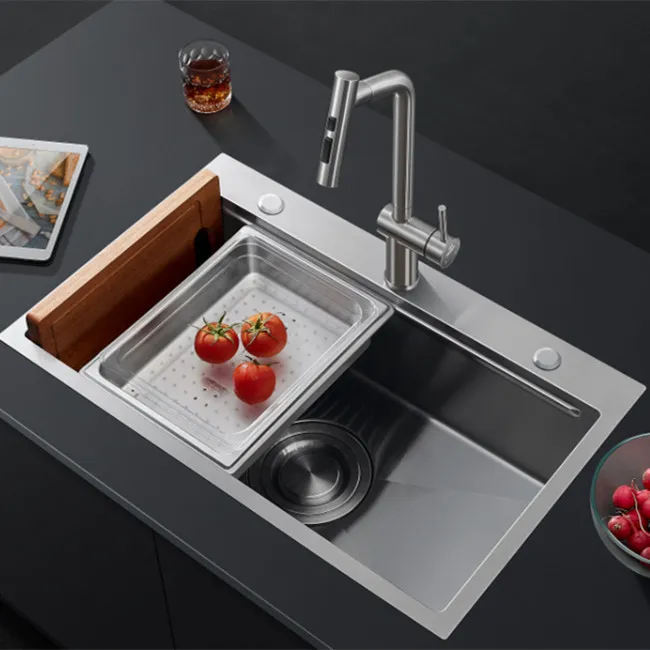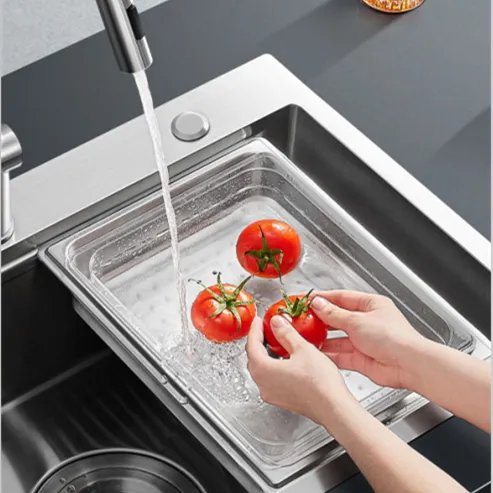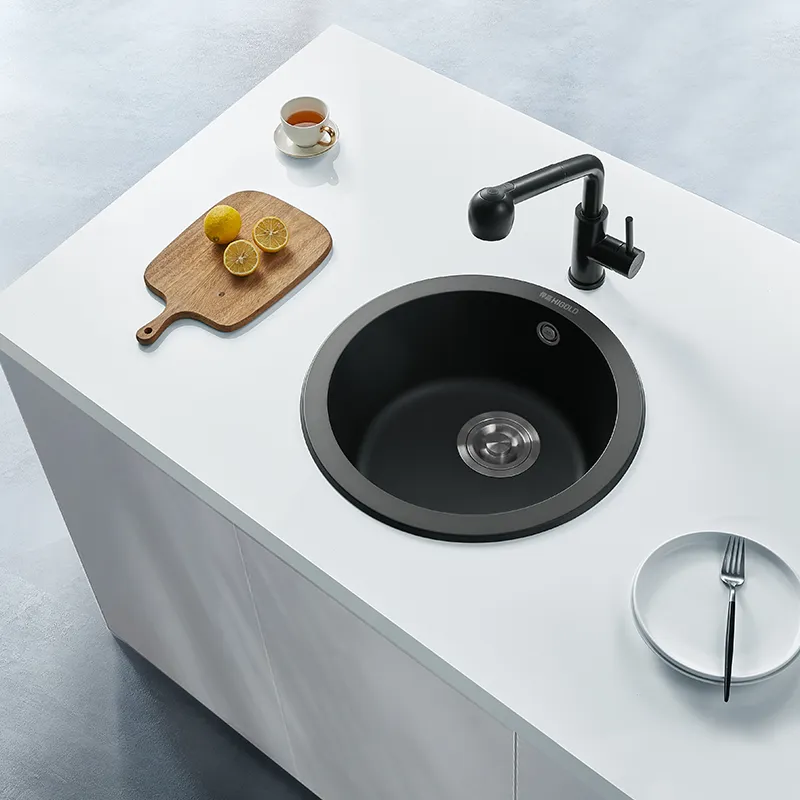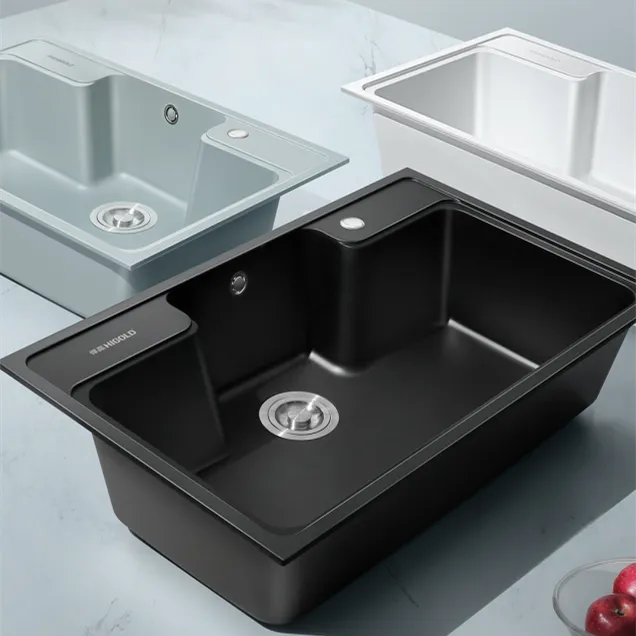A kitchen sink is not only an important work area for washing dishes and food, but also a core detail reflecting the quality and aesthetics of a kitchen.
When choosing a kitchen sink, the two most common choices are stainless steel sinks and composite sinks.
Many Consumers Ask:
"Which is more scratch-resistant, a stainless steel sink or a composite sink?"
"Which sink is more durable and easier to maintain in daily use?"
This article will take a professional perspective, deeply analyzing the material structure, surface hardness, scratch resistance, cleaning difficulty, and long-term performance of the two types of sinks to help you scientifically determine which one is more suitable for your kitchen.

What is a stainless steel sink? Why is it so widely used?
Stainless steel sinks are currently the most common type of sink in residential and commercial kitchens. Their main raw material is stainless steel sheet, generally using 304 or 316 food-grade stainless steel.
This material has excellent corrosion resistance, high toughness, good formability, and can resist damage from daily kitchen washing, impacts, and temperature changes.
Typical characteristics of stainless steel sinks include:
• Strong corrosion resistance: A stable passivation film forms on the stainless steel surface, resisting acid and alkali corrosion.
• Lightweight structure: Lighter in weight than stone or composite materials, making installation easier.
• Good impact resistance: Not easily broken or shattered.
• High plasticity: Can be stamped, bent, or welded into various shapes.
• Diverse surface treatments: Available in brushed, mirror, and matte textures.
Because of these advantages, stainless steel sinks have always been the mainstream choice in the kitchen sink market.
However, it also has a frequently discussed weakness—the surface is easily scratched. So, is it really easily scratched? Let's take a closer look.

What is a composite sink? What are its components and characteristics?
Unlike stainless steel, a composite sink is a new type of material made by pressing together natural quartz particles, granite powder, resin, and additives.
Composite sinks are often referred to as "quartz sinks," "granite sinks," or "composite granite sinks."
The main characteristics of composite sinks include:
• High surface hardness: Quartz particles provide strong scratch resistance;
• Rich colors: A variety of colors such as gray, black, and beige are available to match different kitchen styles;
• Good sound insulation: Compared to metal sinks, they are quieter when washing dishes;
• Strong stain resistance: The dense surface does not easily absorb stains or oil.
However, the dense structure of composite sinks also means they are relatively "brittle," with slightly lower impact resistance than stainless steel sinks, and they are also heavier to install.
What is the essence of scratch resistance?
Before comparing the scratch resistance of stainless steel sinks and composite sinks, we need to understand the concept of "scratch resistance."
Scratch resistance refers to a material's ability to resist scratches when subjected to mechanical friction (such as contact with knives, pot bottoms, and tableware).
The main factors affecting scratch resistance include:
• Material hardness (Mohs hardness)
• Surface treatment process
• Hardness and pressure of the contact object
• Frequency of use and maintenance habits
In short:
The harder the material and the denser the surface, the less likely it is to be scratched.
Below, we will systematically compare the scratch resistance of two types of sinks from these perspectives.

How scratch-resistant are stainless steel sinks?
1. Hardness of Stainless Steel Sinks
The hardness of stainless steel is typically around 4-5 on the Mohs scale.
This means it can resist friction from ordinary plastic or wooden tableware, but if it comes into prolonged contact with hard objects such as steel wool, the bottom of iron pots, and knives, fine scratches may still appear on the surface.
2. Surface Treatment Greatly Affects Scratch Resistance
Stainless steel sinks with different processing methods have significantly different scratch resistance.
• Brushed Finish: The most common finish, effectively concealing minor scratches;
• Matte Finish: More durable but slightly rougher;
• Polished Finish: High gloss, but most prone to showing scratches.
Therefore, choosing a brushed stainless steel sink significantly improves scratch resistance.
3. Self-Healing Ability After Use
One advantage of stainless steel is its self-healing properties.
Minor scratches will reform a passivation film in the air, reducing oxidation marks and making the surface appear smoother.
4. Actual Performance of Stainless Steel Sinks
• Light Friction: Not noticeable;
• Metal Contact: May cause scratches but does not affect use;
• High-Pressure Scratching: Will leave visible marks.
- - -
Although stainless steel sinks may develop fine lines, their high toughness prevents breakage or shattering from scratches, maintaining very high overall durability.
How scratch-resistant are composite sinks?
1. Composite sinks have higher hardness
The main components of composite sinks, quartz and granite, have a Mohs hardness of 6-7, far exceeding that of stainless steel.
Theoretically, they are more scratch-resistant than metal materials, and knives or pot bottoms are less likely to leave marks when sliding on the surface.
2. Dense surface and strong abrasion resistance
Composite materials are molded under high pressure, resulting in a dense surface structure without pores.
This structure disperses the friction surface when the composite sink comes into contact with hard objects, making it difficult to inflict deep scratches.
3. However, high hardness also means greater brittleness
While composite sinks are not easily scratched, they may crack or chip under strong impacts (such as dropping a heavy pot).
This contrasts with the "elasticity" of stainless steel—stainless steel can deform and absorb energy, while composite materials are harder but more brittle.
4. Actual performance of composite sinks
• Friction with ordinary tableware: No obvious scratches;
• Contact with metal knives: Difficult to leave marks;
• Strong impact: May chip or crack.
In daily cleaning, composite sinks are more scratch-resistant than stainless steel sinks, but less impact-resistant.

How much does scratch resistance affect lifespan?
Scratch resistance affects the sink's appearance, but it doesn't necessarily determine its lifespan.
For stainless steel sinks, minor scratches only affect the visual appeal, not structural strength or lifespan.
For composite sinks, although the surface remains smooth and durable, cracks or chipping are difficult to repair and may require replacement of the entire sink.
Therefore, from an overall lifespan perspective:
Stainless steel sinks are more durable, while composite sinks are more aesthetically pleasing.
Stainless Steel Sinks vs. Composite Sinks: Daily Maintenance Comparison
1. Maintenance Recommendations for Stainless Steel Sinks
• Avoid using steel wool or sharp metal cleaning tools;
• Use a neutral detergent or a special stainless steel cleaning paste;
• Wipe regularly with a soft cloth in the direction of the brushed edges;
• Avoid prolonged accumulation of iron to prevent rust marks.
2. Maintenance Recommendations for Composite Sinks
• Clean with a soft sponge, avoiding impact from hard objects;
• Regularly wipe with warm water and a neutral detergent;
• Avoid contact with strong acids and alkalis;
• For minor stains, gently polish with baking soda.
From a maintenance perspective, stainless steel sinks are simpler to maintain and have a higher tolerance for errors, while composite sinks require gentler cleaning methods.
Stainless Steel Sinks vs. Composite Sinks: Common Misconceptions about Scratches
Misconception 1: Thicker Stainless Steel Sinks are Less Prone to Scratches
Thickness primarily affects resistance to deformation and has little to do with scratch resistance. Scratches depend on surface hardness and processing techniques.
Misconception 2: Composite Sinks Will Never Scratch
Although composite sinks are highly scratch-resistant, over long-term use, friction from sand, ceramic, or other metal particles can still leave fine scratches.
Myth 3: Scratches Affect the Hygiene of Stainless Steel Sinks
In fact, scratches on the surface of stainless steel do not trap dirt and grime. With proper daily cleaning, its hygiene performance is perfectly reliable.
Sinks: The Difference Between Visual and Structural Scratch Resistance
When evaluating stainless steel and composite sinks, and considering which is more scratch-resistant, we need to distinguish two aspects:
Comparison Dimensions | Stainless Steel Sink | Composite Water Tank |
| Surface Hardness | Medium (Mohs 4-5) | High (Mohs 6-7) |
| Resistance to Visual Scratch | Medium (Fine lines may appear) | Excellent (smooth surface) |
| Resistance to Structural Damage | Strong (Does not crack) | Weak (prone to chipping) |
| Impact Resistance | Excellent | Average |
| Repairability | Can be lightly polished and repaired | Difficult to repair |
| Overall Service Life Rating | High | Medium-High |
- - -
If you care about maintaining a perfect surface appearance, composite sinks are more scratch-resistant;
If you prioritize impact resistance and long-term stable use, stainless steel sinks are more durable.
How to Choose Based on Kitchen Usage Scenarios?
1. For those who frequently wash cookware and use the kitchen heavily
• Recommendation: Stainless Steel Sink
• Reasons: Strong impact resistance, scratches do not affect structural safety, easy to clean.
2. For those who value a unified and high-quality kitchen appearance
• Recommendation: Composite Sink
• Reasons: Smooth and delicate surface, customizable colors, and natural matching with countertops.
3. For households with hard tableware or frequent use by children
• Recommendation: Stainless steel sink
• Reason: More resistant to accidental handling and impacts.
Stainless Steel Sinks vs. Composite Sinks: Cost-Effectiveness
• Stainless Steel Sinks: Moderate cost, high durability, low long-term maintenance costs;
• Composite Sinks: Higher cost, more aesthetically pleasing, require careful use to extend lifespan.
- - -
If you have a limited budget and want a sink that lasts for many years without needing replacement, a stainless steel sink is a more reliable choice.
If you have a sufficient budget and pursue visual perfection and personalized design, a composite sink is the ideal option.
Why should purchasing managers choose Higold sinks?
Purchasing managers choose Higold because of our combination of factory-direct pricing, high quality standards, and ODM design capability. With certifications like CUPC and CE, our sinks meet global requirements, making importing easier. Buyers enjoy wholesale discounts, stable supply, and quick quotes. Our proven track record with global brands ensures reliable cooperation and consistent product performance.


